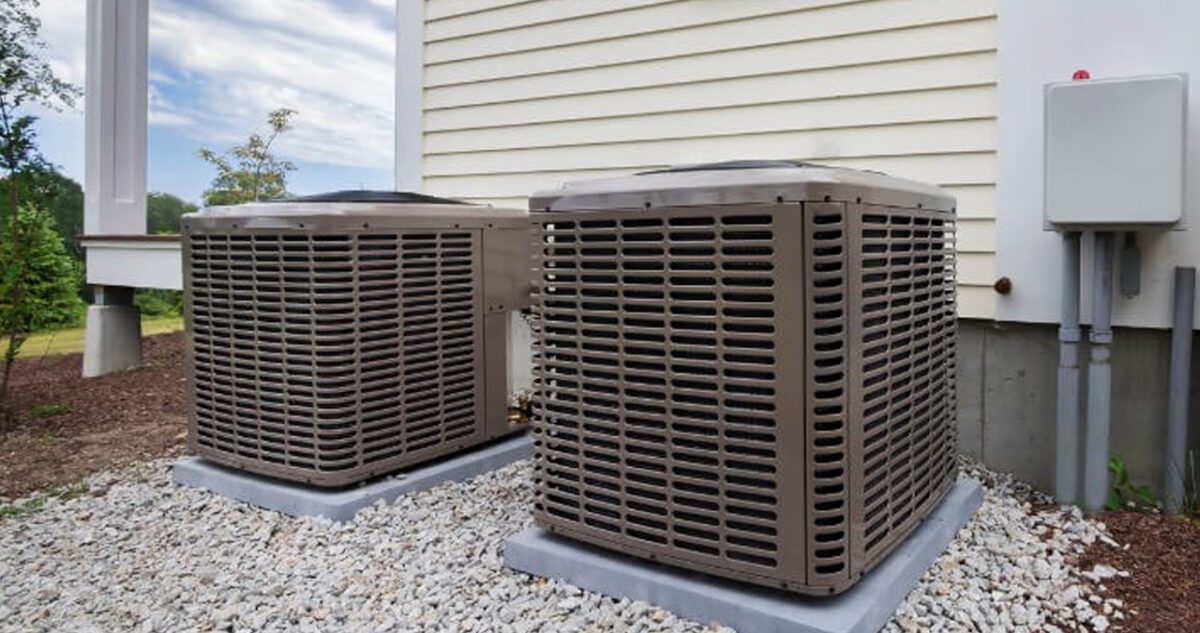
Picture this: you see a puddle under your air conditioner. You may ask yourself, “Why is my air conditioner leaking water?!” While it may seem concerning, water leaks are a common AC issue. Factors like climate, heat and humidity, can strain your AC and lead to leaks. Don’t worry, as an experienced HVAC company in Des Moines, Aspen Aire Heating and Cooling is here to help you find the root of the problem.
Common Causes of AC Water Leaks
Clogged Condensate Drain Line
As your AC cools the warm air, the evaporator coils pull moisture from hot air and creates condensation on the coils themselves. Connected to the drain pan, the condensate drain line transports water outside. As you can probably imagine, if debris and dirt start to clog the drain line, water begins to back up, creating a leaking air conditioner. You can use a wet or dry vac to remove the clog if it is near the end of the line. A vinegar solution will also dissolve buildup. We recommend cleaning your drain line every several months to prevent blockages and scheduling regular maintenance with a trusted HVAC company.
Frozen Evaporator Coils
Nobody wants a frozen AC during the summer. Unfortunately, low refrigerant, dirty air filters and airflow issues can lead to a frozen and leaky air conditioner. Without the proper amount of refrigerant, or a dirty air filter, your AC can’t take in as much warm air, causing the coils to get so cold they freeze. Eventually, the ice will start to melt, leading to a puddle near your home’s HVAC system. To help prevent this issue in the future, change your air filter every 1-3 months, schedule AC maintenance regularly and have your air conditioner’s refrigerant levels tested each year.
Damaged or Rusted Drain Pan
Over time the water that your drain pan was meant to collect can wear through your pan and leak onto the floor. Most of the time, you can repair or replace the pan by patching holes or damage with epoxy putty. If the damaged drain pan is beyond simple fixes or outside of your comfort zone, reach out to a local HVAC company for assistance.
High Humidity
Too much humidity can negatively impact your air conditioner. High humidity forces your AC to work harder to remove excess moisture from the air. As a result, your AC takes in more water and releases more water at the same time. This could flood the drain pan under your AC, lead to frozen coils, or clog the drain line with algae and mold growth. Dehumidifiers, regular maintenance and fresh air filters all help reduce strain on your cooling system during periods of high humidity.
Other Potential Causes
If you’ve checked these issues and your central air system is still leaking water, there may be other issues at play. Improper or poor AC installation can cause a disconnect between the drain line and the drain pan, ultimately causing a water leak. Other potential causes could be a broken condensate pump. Without a working pump, the water is not forced through the line and instead floods the drain pan. In both of these situations it’s best to contact an HVAC technician to diagnose and fix the problem.
DIY Troubleshooting Tips
Safety First: Turn off the Power
Always prioritize safety before troubleshooting your cooling system. Start every process by making sure your AC is off and safe to fix.
Check and Clear the Drain Line
After the AC is completely off, locate and clean the drain line. Most modern air conditioners have a PVC pipe exiting the indoor unit and either going outside or to a floor drain. Once you’ve found the drain line, use a wet or dry vacuum to remove any debris. Afterward, we recommend flushing the drain line with distilled white vinegar and clean water. Before you wrap up, If you come across any damage you are uncomfortable addressing contact an HVAC repair company for assistance. Finally, turn the AC unit back on and ensure the drain line is working properly.
Change the Air Filter
Swapping out a dirty air filter for a new one is an easy DIY air conditioner fix. Locate the air filter slot, which is often behind a vent cover near the blower. Open the cover and simply replace the old filter with the new one. Make sure the arrows on the filter point in the same direction as the old filter. Lastly, close the vent.
Inspect the Drain Pan
When inspecting the drain pan, note any visible signs of damage like cracks, rust and holes. Smaller signs of damage can be patched with epoxy or a waterproof sealant. However, in cases with severe damage, it may be best to replace the entire drain pan.
When to Stop and Call a Pro
In situations like refrigerant leaks, electrical issues, or hardware malfunctions, always call an HVAC professional. Not only is trying to fix these issues by yourself dangerous, but they may also endanger your family.
Prevent Leaks With Professional HVAC Maintenance
Routine air conditioner maintenance can find issues before they become problems. Annual AC tune-ups catch low refrigerant levels and faulty hardware that can lead to an AC leak. If you live in the Des Moines area, it’s best to schedule your air conditioner tune-ups in early spring before the summer heat takes its toll.
Frequently Asked Questions
Is a Leaking AC an Emergency?
Small amounts of water and condensation pooling around your AC are not emergency situations. On the other hand, large amounts of water leaking from the inside of the unit is an emergency. Reach out to an HVAC repair company ASAP.
Can I Use My AC if It’s Leaking?
It is generally safe to use your AC if there are small leaks and condensation from the drain line and there are no wider signs of damage. In scenarios where there is a large leak, electrical issues or refrigerant leaks, it’s best to shut down your AC and contact the pros.
How Much Does it Cost to Fix a Leaking AC in Des Moines?
The price of fixing an AC leak varies based on the cause of the leak and the amount and type of damage it caused.
Don’t Sweat and Air Conditioner Leak
A leaky air conditioner can be alarming, but a licensed HVAC company can help. Whether it’s a clogged drain line, frozen coils, damaged hardware, or weather related issues, contact Aspen Aire Heating & Cooling for fast, reliable AC repair in Des Moines.

